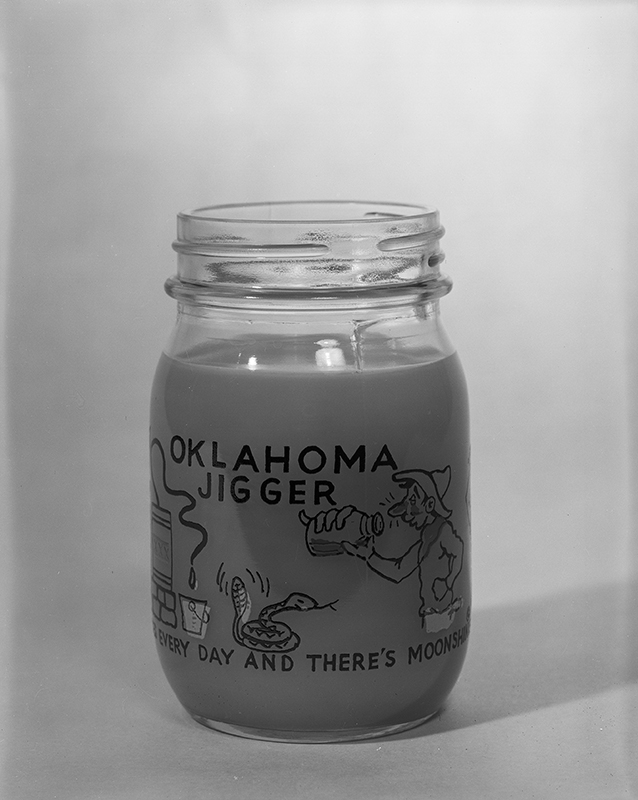
MOONSHINE.
"Moonshine" has had many colloquial names, sometimes being called "rot gut," "white lightnin'," or "corn liquor." By definition, "moonshine" is an "intoxicating liquor, especially illegally distilled corn whiskey." A "moonshiner" is "a maker or seller of illicit whiskey." The European spelling is "whisky" (the United States spelling became whiskey), a Gaelic word meaning "water of life." The water of life, or illegal, illicit liquor, has been a part of world history and lore and is a tradition in the southern United States. Oklahoma is no exception, with many residents traditionally making, selling, and consuming illegal liquor.
Almost from the nation's beginning, the manufacture and sale of whiskey has been taxed as a source of government revenue. Consequently, the primary reason for illegally making whiskey has been to avoid paying the taxes. In 1791, in order to help pay the national debt, and encouraged by Secretary of the Treasury Alexander Hamilton, the U.S. Congress placed an excise tax on whiskey. Many Scotch-Irish settlers, who not only consumed whiskey but also distilled it and sold it for a livelihood, considered the tax to be discriminatory. In 1794 they demonstrated and rebelled in a series of events, primarily on the frontier, called the Whiskey Rebellion. They were arrested, but Pres. George Washington later pardoned them. After the Civil War in some areas taxation on legal alcohol was set at "eight times" the distiller's cost. To avoid paying the tax, in the 1870s many distillers decided to bribe revenue collectors and politicians at all levels of the government. Their efforts became a public scandal known as the Whiskey Ring. Secretary of the Treasury Benjamin Bristow eventually broke the ring, which was one of several scandals during Pres. Ulysses S. Grant's administration.
In Indian Territory it was against federal law to sell or give alcohol to American Indians. In 1889, when the Unassigned Lands (Oklahoma Territory) opened to non-Indian settlement, saloons began operating along the area's eastern and southern borders, adjacent to Indian lands. The liquor traffic was so heavy over the next two decades that the framers of the 1907 state constitution included the prohibition of all alcoholic beverages. Nevertheless, distilling, selling, and consuming moonshine continued after statehood. After national prohibition was repealed in 1933, the state legislature, guided by religious conservatism, passed a law declaring that nothing stronger than 3.2 beer, in alcohol percentage level, could be sold in Oklahoma. In 1959 the law was repealed.
Moonshine is made from fermented grains or mash. In Oklahoma the main ingredient is usually corn, and the product is called "corn whiskey." Other ingredients, such as yeast, malt, and sugar, vary according to the taste of the distiller (moonshiner). The distillation process usually involves copper pots, a fire (alcohol rises at about 172 degrees Fahrenheit), and an oak barrel in which to age and give color to the liquor. As it cooks, the sugar usually creates a sweet odor in the atmosphere. Revenue agents could sometimes locate a still by the smell or could identify a moonshiner by his purchases of large quantities of sugar or other constituents. The resulting product has customarily been "bottled" and sold in fruit-canning jars.
Moonshine has played a major role in Oklahoma history, as has the bootlegger, who sold illegal whiskey to his consumers. Because the law prohibited the selling of 3.2 beer where dancing was allowed, the bootlegger became a major fixture at dance halls. Bootleggers also became Oklahoma folk legends. However, rather than peddling moonshine, most bootleggers sold liquor that had been legally distilled and bottled and "imported" from other states.
The unsophisticated technology of moonshine manufacture often produced a substance that was hazardous to health. The "jake leg" or "jake walk," a permanent, debilitating condition that pulled a leg into an almost useless position, was acquired by drinking moonshine distilled with Jamaican ginger or by drinking Jamaican ginger, which was usually 70 percent alcohol. Some moonshiners learned that "jake" strengthened their product, and some alcoholics learned that Jamaican ginger was as strong as or was stronger than moonshine. Jamaican ginger also contained other dangerous chemicals. Unfortunately, some of the earliest "jake walk" victims were diagnosed in Oklahoma. In the late twentieth century many moonshiners used various methods or added substances, including lye, battery acid, or other caustics, to shorten the distillation and aging time. The resulting liquor could seriously injure or kill the drinker.
Home brew, moonshine, Choc beer and/or other nontaxed and illicit alcoholic beverages have found a large market in Oklahoma. As late as 1963 law enforcement agencies reported that 18,400 stills had been seized nationally in that year, with Oklahoma and Arkansas tied for tenth place in the number of state seizures. Oklahoma's moonshining tradition continued into the twenty-first century.






